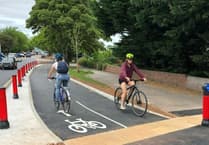WITH the summer holidays in full swing, and hotels and B&Bs filling up fast, our hospitality and leisure businesses are gearing up for their most important time of the year.
From family-run pubs to high street restaurants and bustling hotels, our hospitality sector not only brings our communities together but provides jobs and footfall for our local economy.
However, business remains tough for many of these well-loved establishments. This summer I’ve been right across the constituency from the Ley Arms in Kenn to the Manor House Hotel near Okehampton, meeting many of our enviable hospitality businesses.
The message I have received has been consistent, repeated to me at every stop. Rising costs across the board, and particularly the National Insurance increase, are squeezing already wafer-thin margins.
Once profitable concerns are too often now finding it hard to stay afloat. Meanwhile, despite minimum wage rises, many staff are also actually taking home less.
The reason? Fewer shifts and shorter hours as businesses struggle to cope.
To discuss these challenges, I was pleased to welcome the CEO of UK Hospitality, Kate Nicholls, to Devon last weekend, but I wish it were under better circumstances.
Since Labour’s Budget last October, the hospitality industry has lost 84,000 jobs, and almost half of its businesses are either just breaking even or worse.
It was especially concerning that minimal consultation had taken place before these changes were announced and that reductions in staff numbers most acutely impact young people, apprentices, women and parents in need of flexible work.
Upcoming Labour employment legislation is set to make things worse through raising the risks of taking new people on.
Those young first jobbers are the most likely to be hit due to having no working career record.
This has long-term consequences for our high streets, our young people and their employability, but also for our wider economy.
For businesses that remain open, their reputations are at stake, with waiters asked to oversee eight to 10 tables as opposed to four or five.
That kind of stretch inevitably impacts the experience for diners and drinkers, which in turn can drive down footfall even further.
One brighter point is the ability that the sector has to adjust. Our local entrepreneurs show real resilience.
For instance, on a recent visit to Union Road Moto Velo in Crediton, I was hugely impressed with how the motorbike shop had successfully grown into a café, a clothing brand, and now a thriving B&B, all thanks to the dedication of owner Neil Paterson and his team.
Hospitality has always been a driver of growth and employment, particularly in rural areas like ours.
It’s time we backed our pubs, cafes, hotels and restaurants instead of loading them up with ever higher taxes.
I’ll continue to raise these concerns in Westminster, promote our local businesses and make sure the voices of Devon’s hospitality industry are heard.
Hospitality is the heart of our high streets, we must support it.
Mel Stride
MP for Central Devon





Comments
This article has no comments yet. Be the first to leave a comment.